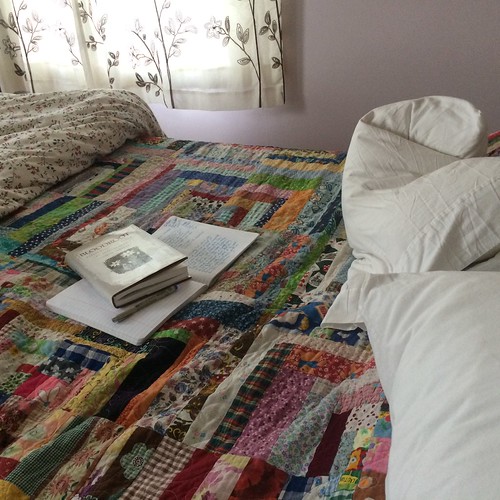“I grew up in a family that valued place,” Lisa Koger wrote in her essay “Writing in the Smokehouse.” “We valued it so much that we could not bear to take vacations that would necessitate traveling more than fifteen miles from home. We didn’t choose that distance arbitrarily. Fifteen miles was the maximum distance we figured we could walk in a single day in case homesickness struck, our car broke down, and we craved to spend the night under handsewn quilts in our own cozy rooms.”
My mother is a quilter, a crafter of exquisite, boisterous, practical art, rich in meaning and memory. Her quilt for me was pieced from thousands of scraps, the remnants of clothes sewn for herself and her six children.
I was the only child to pick up the skill, and my quilt contains a snip of corduroy from my first sewing project–a vest made on a treadle machine. There’s also remnants from the futon I slept on as a girl, fabric for school blouses, skirts I made myself as a teenager, curtains made for a sister’s first apartment, my wedding gown, and my daughter’s first birthday dress.
When the quilt first covered my bed, I couldn’t pass it without my eye fixating on one fabric or another, and my mind calling forth the memory linked to it. It was both a blessing and a burden. But with familiarity and use, the quilt’s power lessened until my eyes passed over it without seeing or remembering anything at all.
I’ve been preoccupied and anxious, even losing sleep, over the concepts of home and common space, of neighbor and land needs, resiliency, risk, and of our civic duty to prioritize shared needs over individual desires. At my sister’s urging, I signed up for a yearlong online course in compassion led by Thom Bond from the New York Center for Nonviolent Communication. In the welcome packet, he quotes a proverb: If you want to go fast, go alone. If you want to go far, go with others.
Drawn to the idea, curious of its authorship (and awake at one in the morning), I did some cursory research and discovered that Snopes, National Public Radio and Jezebel have all attempted to uncover the source of the saying. Seems like everyone from Cory Booker to Jodi Picoult to a Scandinavian medical journal credit Africa as the proverb’s source, while others claimed they were the dying words of not one, but two, billionaires.
Regardless of its origins, wrote Joel Goldberg for NPR’s global health and development blog, “Goats and Soda,” the proverb reflects the spirit of some African cultures. “The Africanist perspective is more about community, it’s more about collaboration. It’s less about what we can do individually,” Neal Lester, a humanities professor at Arizona State University who specializes in African-American literary studies told Goldberg. “The essence of the proverb speaks to a certain worldview that challenges Western individualism. ‘”
Lester’s explanation sounded plausible. And I was amused by Jezebel’s suggested new proverb and attribution: “That’s probably not an African proverb” — African proverb. But in the end, my search only uncovered the underlying anxiety that was keeping me up at night. Sigh. Unable to let go of what worried me, I climbed back under my mother’s quilt and hid.
- Writer Lisa Koger’s essay appeared in the 1998 “Bloodroot: Reflections on Place by Appalachian Women Writers,” (public library).
- My sister’s recommended compassion course.
- NPR’s interview with Neal Lester.
- Snope’s last words on dying billionaires.
- Scandinavian Journal of Primary Health Care.
- Jezebel’s conclusion.


Leave a Reply